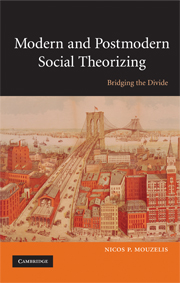Book contents
- Frontmatter
- Contents
- List of figures
- Acknowledgements
- Introduction
- Part I The theoretical background: the development of the agency–structure problematic
- Part II Parsonian and post-Parsonian developments
- Part III Agency and structure: reworking some basic conceptual tools
- Part IV Bridges between modern and late/postmodern theorizing
- 9 Modernity: a non-Eurocentric conceptualization
- 10 Ethical relativism: between scientism and cultural relativism
- 11 Cognitive relativism: between positivistic and relativistic thinking in the social sciences
- 12 Social causation: between social constructionism and critical realism
- Part V Towards a non-essentialist holism
- Instead of Conclusion: Twelve rules for the construction of an open-ended holistic paradigm
- Appendix: In defence of ‘grand’ historical sociology
- References
- Index
9 - Modernity: a non-Eurocentric conceptualization
Published online by Cambridge University Press: 05 June 2012
- Frontmatter
- Contents
- List of figures
- Acknowledgements
- Introduction
- Part I The theoretical background: the development of the agency–structure problematic
- Part II Parsonian and post-Parsonian developments
- Part III Agency and structure: reworking some basic conceptual tools
- Part IV Bridges between modern and late/postmodern theorizing
- 9 Modernity: a non-Eurocentric conceptualization
- 10 Ethical relativism: between scientism and cultural relativism
- 11 Cognitive relativism: between positivistic and relativistic thinking in the social sciences
- 12 Social causation: between social constructionism and critical realism
- Part V Towards a non-essentialist holism
- Instead of Conclusion: Twelve rules for the construction of an open-ended holistic paradigm
- Appendix: In defence of ‘grand’ historical sociology
- References
- Index
Summary
Introduction
Ever since the concepts of modernity and modernization entered the sociological literature, they have been criticized for their emphatically Eurocentric nature. Whether one looks at such obvious instances as Parsonian neo-evolutionism and its applications to the study of Third World development, or at more sophisticated uses of the term in, for instance, the works of Giddens or Stewart Hall – all of them, according to the critics, manifest a strong tendency to view non-Western developmental trajectories (past, present and future) in terms of ‘what happened in the West’.
In the case of the Parsonian-oriented sociology of modernization, for example, the well-known ideal-typical ‘tradition/modernity’ dichotomy places Western societies at the modern end of the continuum, with Third World countries moving more or less rapidly up the evolutionary ladder through the diffusion of Western values, technology and capital. As to Giddens (1985), who does attempt to avoid any conceptualization tainted by evolutionist and/or functionalist thinking, he too views capitalism as a major component of modernity (together with industrialism and the centralized means of violence and surveillance). This results in a situation where the non-capitalist developmental paths followed for more than half a century by the Soviet Union and other countries are considered as non-modern. Stewart Hall, although he differs from Giddens in viewing contemporary Western societies as postmodern rather than late modern, again sees capitalism as a fundamental dimension of modernity, and argues that pre-1989 Eastern European societies constitute exceptions.
- Type
- Chapter
- Information
- Modern and Postmodern Social TheorizingBridging the Divide, pp. 145 - 163Publisher: Cambridge University PressPrint publication year: 2008



